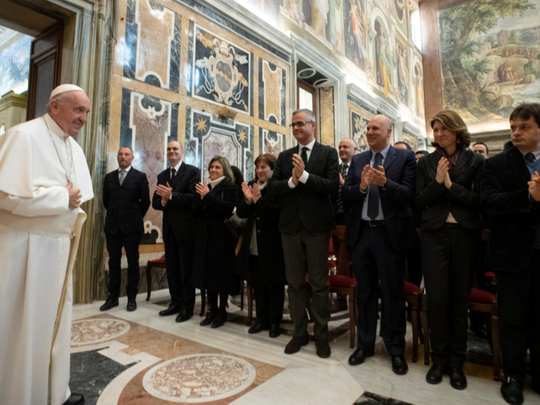
The Vatican’s summit on sexual abuse concluded recently with an address from Pope Francis. The meeting drew together heads of bishops’ conferences from across the globe in the hope of producing concrete policies aimed at preventing clergy sexual abuse and responding properly to cases that arise anyway.
But the greater accomplishment of the summit — which ultimately produced little in the way of actionable solutions — may have been its effort to reckon with how extraordinarily evil this crisis really is. “Today,” Francis said in his parting address, “we find ourselves before a manifestation of brazen, aggressive and destructive evil. We need to take up the spiritual means that the Lord himself teaches us: Humiliation, self-accusation, prayer and penance.”
It was the right note for Francis to end on, especially since Vatican has shown signs of temptation towards more exonerating narratives before.
Cases of child sexual abuse by Catholic priests, nuns and members of religious orders have been widespread over the years and have led to many allegations and investigations. Plenty of Catholics have been moved to chalk up concern over the crisis to a media conspiracy against the faith, or to blame it on either the conservative or liberal wing of the church hierarchy, depending on the preference of the beholder. But all of those interpretations of events seem to locate the source of evil in some external darkness, which aims — intelligently, but maliciously — to undermine the church. This represents an enormous failure of introspection.
John Grogan, a Philadelphia lawyer and Catholic, was surprised when his family’s own priest approached him in the aftermath of the 2002 explosion of the church sexual abuse crisis, asking for his help as an advocate. The priest had been convicted of possession of child pornography decades back — but had been allowed back into the ministry. When he sought Grogan’s help, he thought he was facing a canonical trial and potential laicisation. As it turned out, he was forcibly laicised without canonical trial. The penalty was not unlike the one recently placed on former Cardinal Theodore McCarrick. The priest wanted Grogan’s help. Grogan agreed.
‘The big question’
“That led me into sort of dealing with priests in similar circumstances,” Grogan told me during a recent phone interview. “The big question for me with many of these guys is there’s so much good in them, and yet this horrific, outrageous criminal blind spot that can’t be explained away, or can’t be excused.” Grogan recognised the individual offenders’ capacity for sin and temptation, just as Francis has mentioned. But he also came to see that, in many cases, the abusers have little insight into the gravity of their crimes.
Several of the priests he worked with, Grogan told me, saw themselves as “victimised,” with a tendency for “blaming others. If they grudgingly admit that they did what they did,” Grogan said, they were still much more focused on perceived unfairnesses heaped upon them in the trial process and the media. “My overwhelming impression of many of them ... has been just a shocking, shocking lack of emotional maturity.” Most of them never reckon with their crimes, Grogan said, or recognise the severity of the harm they have caused.
It’s been many years since Grogan has worked with accused priests. It isn’t something he’s eager to do again. But he lives in hope, he said, of a church that can face what the sexual abuse crisis has wrought on so many innocent lives — and begin the process of healing and enacting definitive change.
That reckoning has to include the totality of the church: Not just convicted abusers and not just the pope, but every clergy member and lay person in between. Yes, many of us are beckoned by temptation, but not many sins are as deeply evil and damaging as those brought to light by coverage of the sexual abuse crisis and its cover-up.
Francis is right to face the evil inside the church and name it for what it is. But naming it is only a portion of the church’s responsibility: Responding with like intensity and urgency is the vast remainder, and that remains to be seen.
— Washington Post
Elizabeth Bruenig is an American columnist who specialises in ethics, politics and theology.









